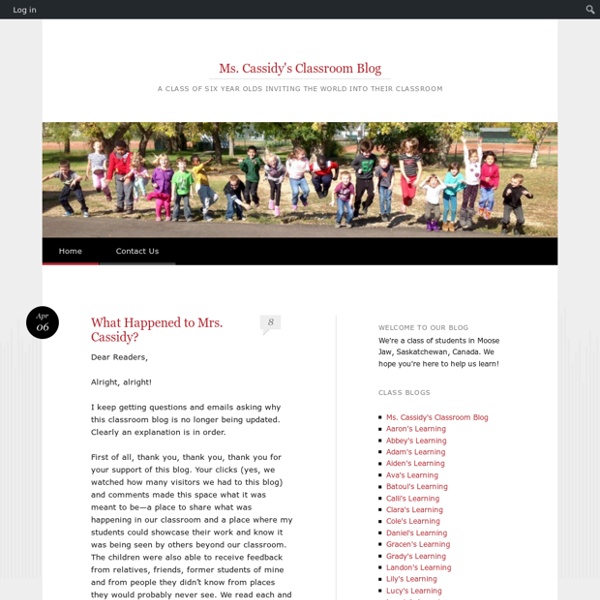



http://mscassidysclass.edublogs.org/
Blackboard Learn Today's active learner expects to be able to easily connect online with their different communities – including their education community. However, they want to keep their academic and personal lives separate. So we worked with students, educators, and administrators to develop a global learning network for Blackboard Learn. This network connects users at Blackboard Learn institutions around the globe and enables them to learn from each other through social, informal means – complementing the more formal classroom and online course experiences. Because we all know that learning doesn't end when you leave the classroom.
News & Trends Archives - Cool Cat Teacher Blog Paper by 53, a favorite sketchnoting app of many, gets major updates like cloud backup and Activity Center where you can share and find sketchnotes of others. This is very cool for sketchnoting fans and those who just like information. While I struggle with sketchnoting, I have this app and will be playing with it […] Education technology startups are hot. Sweeping changes are moving through education as technology has become more affordable and scalable. Now is the time. Inquiry & Reflection for Better Learning Yesterday, I had the opportunity to sit in on a conversation with some smart folks in the maker education community1. We were continuing a conversation we started on Twitter a month or so back. You can watch a recording of yesterday’s piece of the conversation here. You should listen/watch the conversation. I learned a lot […]
Edmodo Promotes Blended Learning Tagged with: Blended LearningVideo When students at Meadowbrook High School were asked to show administrators how their teachers incorporate the digital world into their classes, the students chose to highlight how their teachers use Edmodo both as an instructional support tool and a tool for professional development. Rather than writing an article for the school newspaper, the students produced a video as part of their MBK411 news series. Under the direction of teacher Randy West, the students presented their video to the Chesterfield County School Board to show evidence of how teachers are incorporating blended learning into their classrooms.
10 Health and Fitness Apps To Make Getting Fit Fun “Exercise is a dirty word. Every time I hear it I wash my mouth out with chocolate.” ― Charles M. Schulz I’ve previously shared about cooking, let’s get physical. Lakeside High School Edmodo Pages Lakeside Jr. High and High School have moved their teacher web pages to Edmodo. This online educational networking site allows for easier access to each course. Before a student or parent can create an Edmodo account, they will need a 6-digit group code from their teacher. This code can be found in Pinnacle (the online gradebook). It should be the first assignment listed under the course. If I'm Such a Great Teacher, Why Do I Want to Quit? April and May are tough times of the year for me. Every year. Right now, I teach straight from 8:11 until 2:11. Then, at 2:11, my room is usually full of kids working on projects for other teachers — needing password resets and help.
How Learnopia Works for Teachers Course Description This course reviews all of the features of Learnopia from the perspective of a teacher. By the end of the course you will be comfortable with building, publishing and running a course. Enroll in this Course Course Materials This chapter will review some of the features that should be considered before you start building your course. Category:Educational technology Educational technology is the use of technology in education to improve learning and teaching. Educational technology is also known as instructional technology or learning technology. The words educational and technology in the term educational technology have the general meaning. Educational technology is not restricted to the education of children, nor to the use of high technology.